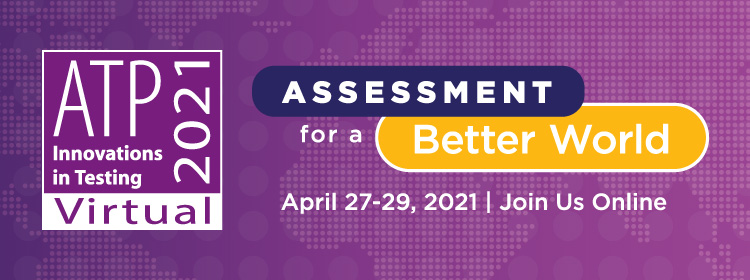
A freelance translator at the ATP 2021 Conference—Is it worth it?
This is my first post in the “Where the clients are”series, where I discuss and review some industry-specific talks, conferences, and congresses I’ve attended. As freelancers, we're told we should go to events like these to get to know the lingo, meet the stakeholders, and understand the main issues of the industry. After all, our job is to help clients address these issues.
But there’s a catch: these events tend to be pricey andthere’s no guarantee we’ll get much back from our investment, especially if we don't naturally belong to that community. This series is told from my perspective—that of a psychologist and English to Spanish freelance translator—so the posts will be focused on healthcare, education, and psychology events and what to expect if you’re thinking of attending.
My first post is about the ATP 2021 Innovations in Testing Conference, which was held virtually from April 27-29, 2021.The theme of this year’s event was “Assessment for a better world”.

ATP 2021 Conference banner
What is the ATP
The Association of Test Publishers (ATP) is an international non-profit organization that brings together providers of tests and assessment tools for lots of different contexts, for example for credentialing, educational, clinical, or selection purposes.The ATP focuses on standardized tests and assessments used to measure different skills, knowledge, and interests in these different contexts. It represents everyone who’s anyone in the assessment community, from the subject matter experts (SMEs) and psychometricians who design the tests to the regulatory bodies that govern their use and scope.
Who goes to the ATP Conference?
The ATP organizes several events throughout the year: some are small (e.g., division coffee talks), some are specific (e.g., summits about security in testing environments), and some—like the one I attended—are big and broad.
It's very easy to find out who might go to this conference: you can check their Our members page! Of course, not every organization from this list will attend, but it's a good starting point. Most members are organizations that provide assessment services as a main offering or maybe as just one part of their mission, related to certification in specific fields (e.g., American Association of Medical Assistants).
ATP Conference highlights
There were many highlights, but the key discussion topic was the industry upheaval as a result of the COVID-19 pandemic. Testing companies have had to adapt to remote testing almost overnight in order to continue providing their services.
The pandemic even made its way into more general talks, which discussed the huge change in practices, the legal implications (e.g., privacy rights for the examinees), and the more practical consequences (e.g., cheating).
Another important topic (and here the "assessment for a better world" part comes into play) was the emphasis on fairness in testing, which is all about accommodations for people with disabilities, and culture-fair tests.
What did I learn?
Two topics particularly piqued my interest:
- Culture fairness: as a translator, I’m interested in how adaptation can reduce or eliminate the biases surrounding a testing process. It was inspiring to hear that the assessment community is focused on this objective throughout the process, and not just when the test is already in the examinee's hands.
- I learned about different adaptation approaches from Steve Dept and his team. They recommend a proactive approach to cultural fairness right from the design phase, instead of just fixing problems as they arise, jeopardizing the psychometric properties of the test.
- Now that certifications and assessments are offered globally, I also learned how important it is to think about different variants of the same language, not only from a purely linguistic point of view, but also from a cultural perspective. For example, if the test mentions a food or a sport that is very specific, how can this be adapted without affecting the psychometric properties?
- There was also an illuminating conversation about new markets (new cultures!) with Paula Baciu, who discussed Latin America, Asia, and other markets not usually covered in talks.
- Accommodations: as a psychologist, I've worked in the field of inclusive education, specifically providing support on accommodations to faculty members and higher-education students. It was encouraging to see how providers take this aspect seriously when designing and administering tests.
- I learned about the application of the Americans with Disabilities Act (ADA) from John Hosterman, Donald Balasa, and Heather Case.
- I found out more about the effect of anxiety in test takers and how to provide accommodations from Benjamin Lovett.
- I saw how easy changes can make a difference for certain conditions, like using special fonts for people with dyslexia, from Kathryn Owens and Ben Brady.
What’s in it for a freelance translator?
There were some topics of general interest even if you don't know much about the industry, but they were the exception rather than the rule. I would approach this event mainly as an opportunity to learn more about the industry, to get to know the issues your potential clients are facing.
It’s also important to know that most attendees belong to organizations (big and small) and there are few individuals without affiliations to these (like in my case).
Is it too technical?
I don’t think so. There are some talks that go into the specifics of psychometrics, and where you may need some fundamentals; but fear not, the conference team sends the recordings afterward, so you can(re)watch and learn at your own pace.
Overall, the conference had a good balance between long presentations and brief and dynamic discussions; as a result, it wasn’t monotonous and it was easy to switch between them.
How was the networking?
They had their own app with an integrated feed. That way, you could post there if you didn't fancy doing it on social media. There were also hashtags like #atpconf, so you could check what others were saying about the event.
The app included a handy list of attendees who could be contacted directly from there.
My top takeaway
- Test anxiety is something that most of us experience (e.g., 30-50% of college students) to different degrees, and although we may think intuitively that performance could be greatly affected by it, it seems the association is not that clear-cut.
- Accommodations to address anxiety are designed to make the situation more comfortable for the person.
In summary
The ATP 2021 Conference was a great experience for me. I now have a better understanding of the whole assessment process and of what’s important to people along the different parts of the chain. Before, I had a more fragmented view as a test user (as a psychologist) and as part of the test adaptation process (as a translator).
I still need to watch some of the discussions I couldn't attend, so the learning continues!

is a psychologist and English to Spanish translator. She specializes in the fields of psychology, healthcare and medicine, and education. In this blog, she writes about everything she knows or has learned that could be useful or of interest to you!